- Home
- Ian Fleming
Bond 13 - The Man With the Golden Gun
Bond 13 - The Man With the Golden Gun Read online
“A gory, glittering saga...the James Bond spirit soars on.”
—New York Times
“Fleming keeps you riveted.”
—Sunday Telegraph
“For those who like to escape to Bondsville, the old boom-town hasn’t changed a scrap.”
—Listener
“Mr. Fleming is in a class by himself.”
—Daily Mail
“Bond is what every man would like to be, and what every woman would like to have between her sheets”
—Raymond Chandler
“One of the most cunningly synthesised heroes in crime-fiction.”
—Observer
“Mr. Fleming is splendid; he stops at nothing.”
—New Statesman
“Mr. Fleming is a most compelling story-teller.”
—The Times
“Our foremost literary magician.”
—New York Herald Tribune
THE JAMES BOND BOOKS
* * *
Casino Royale
* * *
Live and Let Die
* * *
Moonraker
* * *
Diamonds Are Forever
* * *
From Russia With Love
* * *
Dr No
* * *
Goldfinger
* * *
For Your Eyes Only
* * *
Thunderball
* * *
The Spy Who Loved Me
* * *
On Her Majesty’s Secret Service
* * *
You Only Live Twice
* * *
The Man with the Golden Gun
* * *
Octopussy and The Living Daylights
* * *
THE MAN WITH THE GOLDEN GUN © Ian Fleming Publications Ltd 1965 Thomas & Mercer edition, October 2012
Ian Fleming has asserted his right under the Copyright, Designs and Patents Act 1988 to be identified as the author of this work.
James Bond and 007 are registered trademarks of Danjaq LLC, used under license by Ian Fleming Publications Ltd.
This book is sold subject to the condition that it shall not,by way of trade or otherwise, be lent, resold, hired out, or otherwise circulated without the publisher’s prior consent in any form of binding or cover other than that in which it is published and without a similar condition, including this condition, being imposed on the subsequent purchaser.
First published in Great Britain by Jonathan Cape in 1965.
All rights reserved.
The characters and events portrayed in this book are fictitious. Any similarity to real persons, living or dead, is coincidental and not intended by the author.
Published by Thomas & Mercer
P.O. Box 400818
Las Vegas, NV 89140
ISBN-13: 9781612185576
ISBN-10: 1612185576
Library of Congress Control Number: 2012913451
CONTENTS
* * *
1 ‘CAN I HELP YOU?’
2 ATTENTAT!
3 ‘PISTOLS’ SCARAMANGA
4 THE STARS FORETELL
5 NO. 3½ LOVE LANE
6 THE EASY GRAND
7 UN-REAL ESTATE
8 PASS THE CANAPÉS!
9 MINUTES OF THE MEETING
10 BELLY-LICK, ETC
11 BALLCOCK, AND OTHER, TROUBLE
12 IN A GLASS, VERY DARKLY
13 HEAR THE TRAIN BLOW!
14 THE GREAT MORASS
15 CRAB-MEAT
16 THE WRAP-UP
17 ENDIT
ABOUT THE AUTHOR
1 ....... ‘CAN I HELP YOU?’
THE SECRET Service holds much that is kept secret even from very senior officers in the organization. Only M. and his Chief of Staff know absolutely everything there is to know. The latter is responsible for keeping the Top Secret record known as ‘The War Book’ so that, in the event of the death of both of them, the whole story, apart from what is available to individual Sections and Stations, would be available to their successors.
One thing that James Bond, for instance, didn’t know was the machinery at Headquarters for dealing with the public, whether friendly or otherwise – drunks, lunatics, bona fide applications to join the Service, and enemy agents with plans for penetration or even assassination.
On that cold, clear morning in November he was to see the careful cog-wheels in motion.
The girl at the switchboard at the Ministry of Defence flicked the switch to ‘Hold’ and said to her neighbour, ‘It’s another nut who says he’s James Bond. Even knows his code number. Says he wants to speak to M. personally.’
The senior girl shrugged. The switchboard had had quite a few such calls since, a year before, James Bond’s death on a mission to Japan had been announced in the Press. There had even been one pestiferous woman who, at every full moon, passed on messages from Bond from Uranus where it seemed he had got stuck while awaiting entry into heaven. She said, ‘Put him through to Liaison, Pat.’
The Liaison Section was the first cog in the machine, the first sieve. The operator got back on the line: ‘Just a moment, sir. I’ll put you on to an officer who may be able to help you.’
James Bond, sitting on the edge of his bed, said, ‘Thank you.’
He had expected some delay before he could establish his identity. He had been warned to expect it by the charming ‘Colonel Boris’ who had been in charge of him for the past few months after he had finished his treatment in the luxurious Institute on the Nevsky Prospekt in Leningrad. A man’s voice came on the line. ‘Captain Walker speaking. Can I help you?’
James Bond spoke slowly and clearly. ‘This is Commander James Bond speaking. Number 007. Would you put me through to M., or his secretary, Miss Moneypenny. I want to make an appointment.’
Captain Walker pressed two buttons on the side of his telephone. One of them switched on a tape recorder for the use of his department, the other alerted one of the duty officers in the Action Room of the Special Branch at Scotland Yard that he should listen to the conversation, trace the call, and at once put a tail on the caller. It was now up to Captain Walker, who was in fact an extremely bright ex-prisoner-of-war interrogator from Military Intelligence, to keep the subject talking for as near five minutes as possible. He said, ‘I’m afraid I don’t know either of these two people. Are you sure you’ve got the right number?’
James Bond patiently repeated the Regent number which was the main outside line for the Secret Service. Together with so much else, he had forgotten it, but Colonel Boris had known it and had made him write it down among the small print on the front page of his forged British passport that said his name was Frank Westmacott, company director.
‘Yes,’ said Captain Walker sympathetically. ‘We seem to have got that part of it right. But I’m afraid I can’t place these people you want to talk to. Who exactly are they? This Mr Em, for instance. I don’t think we’ve got anyone of that name at the Ministry.’
‘Do you want me to spell it out? You realize this is an open line?’
Captain Walker was rather impressed by the confidence in the speaker’s voice. He pressed another button and, so that Bond would hear it, a telephone bell rang. He said, ‘Hang on a moment, would you? There’s someone on my other line.’ Captain Walker got on to the head of his Section. ‘Sorry, sir. I’ve got a chap on who says he’s James Bond and wants to talk to M. I know it sounds crazy and I’ve gone through the usual motions with the Special Branch and so on, but would you mind listening for a minute? Thank you, sir.’
Two rooms away a harassed man, who was the Chief Security Officer f
or the Secret Service, said ‘Blast!’ and pressed a switch. A microphone on his desk came to life. The Chief Security Officer sat very still. He badly needed a cigarette, but his room was now ‘live’ to Captain Walker and to the lunatic who called himself ‘James Bond’. Captain Walker’s voice came over at full strength. ‘I’m so sorry. Now then. This man Mr Em you want to talk to. I’m sure we needn’t worry about security. Could you be more specific?’
James Bond frowned. He didn’t know that he had frowned and he wouldn’t have been able to explain why he had done so. He said, and lowered his voice, again inexplicably, ‘Admiral Sir Miles Messervy. He is head of a department in your Ministry. The number of his room used to be twelve on the eighth floor. He used to have a secretary called Miss Moneypenny. Good-looking girl. Brunette. Shall I give you the Chief of Staff’s name? No? Well let’s see, it’s Wednesday. Shall I tell you what’ll be the main dish on the menu in the canteen? It should be steak-and-kidney pudding.’
The Chief Security Officer picked up the direct telephone to Captain Walker. Captain Walker said to James Bond, ‘Damn! There’s the other telephone again. Shan’t be a minute.’ He picked up the green telephone. ‘Yes, sir?’
‘I don’t like that bit about the steak-and-kidney pudding. Pass him on to the Hard Man. No. Cancel that. Make it the Soft. There was always something odd about 007’s death. No body. No solid evidence. And the people on that Japanese island always seemed to me to be playing it pretty close to the chest. The Stone Face act. It’s just possible. Keep me informed, would you?’
Captain Walker got back to James Bond. ‘Sorry about that. It’s being a busy day. Now then, this inquiry of yours. Afraid I can’t help you myself. Not my part of the Ministry. The man you want is Major Townsend. He should be able to locate this man you want to see. Got a pencil? It’s No. 44 Kensington Cloisters. Got that? Kensington double five double five. Give me ten minutes and I’ll have a word with him and see if he can help. All right?’
James Bond said dully, ‘That’s very kind of you.’ He put down the telephone. He waited exactly ten minutes and picked up the receiver and asked for the number.
James Bond was staying at the Ritz Hotel. Colonel Boris had told him to do so. Bond’s file in the K.G.B. Archive described him as a high-liver, so, on arrival in London, he must stick to the K.G.B. image of the high life. Bond went down in the lift to the Arlington Street entrance. A man at the newsstand got a good profile of him with a buttonhole Minox. When Bond went down the shallow steps to the street and asked the commissionaire for a taxi, a canonflex with a telescopic lens clicked away busily from a Red Roses laundry van at the neighbouring goods entrance and, in due course, the same van followed Bond’s taxi while a man inside the van reported briefly to the Action Room of the Special Branch.
No. 44 Kensington Cloisters was a dull Victorian mansion in grimy red brick. It had been chosen for its purpose because it had once been the headquarters of the Empire League for Noise Abatement, and its entrance still bore the brass plate of this long-defunct organization, the empty shell of which had been purchased by the Secret Service through the Commonwealth Relations Office. It also had a spacious old-fashioned basement, re-equipped as detention cells, and a rear exit into a quiet mews.
The Red Roses laundry van watched the front door shut behind James Bond and then moved off at a sedate speed to its garage not far from Scotland Yard while the process of developing the canonflex film went on in its interior.
‘Appointment with Major Townsend,’ said Bond.
‘Yes. He’s expecting you, sir. Shall I take your raincoat?’ The powerful-looking doorman put the coat on a coat-hanger and hung it up on one of a row of hooks beside the door. As soon as Bond was safely closeted with Major Townsend, the coat would go swiftly to the laboratory on the first floor where its provenance would be established from an examination of the fabric. Pocket dust would be removed for more leisurely research. ‘Would you follow me, sir?’
It was a narrow corridor of freshly painted clapboard with a tall, single window which concealed the Fluoroscope triggered automatically from beneath the ugly patterned carpet. The findings of its X-ray eye would be fed into the laboratory above the passage. The passage ended in two facing doors marked ‘A’ and ‘B’. The doorman knocked on Room B and stood aside for Bond to enter.
It was a pleasant, very light room, close-carpeted in dove-grey Wilton. The military prints on the cream walls were expensively framed. A small, bright fire burned under an Adam mantelpiece which bore a number of silver trophies and two photographs in leather frames – one of a nice-looking woman and the other of three nice-looking children. There was a central table with a bowl of flowers and two comfortable club chairs on either side of the fire. No desk or filing cabinets, nothing official-looking. A tall man, as pleasant as the room, got up from the far chair, dropped The Times on the carpet beside it, and came forward with a welcoming smile. He held out a firm, dry hand.
This was the Soft Man.
‘Come in. Come in. Take a pew. Cigarette? Not the ones I seem to remember you favour. Just the good old Senior Service.’
Major Townsend had carefully prepared the loaded remark – a reference to Bond’s liking for the Morland Specials with the three gold rings. He noted Bond’s apparent lack of comprehension. Bond took a cigarette and accepted a light. They sat down facing one another. Major Townsend crossed his legs comfortably. Bond sat up straight. Major Townsend said, ‘Well now. How can I help you?’
Across the corridor, in Room A, a cold Office-of-Works cube with no furniture but a hissing gas fire, an ugly desk with two facing wooden chairs under the naked neon, Bond’s reception by the Hard Man, the ex-police superintendent (‘ex’ because of a brutality case in Glasgow for which he had taken the rap) would have been very different. There, the man who went under the name of Mr Robson would have given him the full intimidation treatment – harsh, bullying interrogation, threats of imprisonment for false representation and God knows what else, and, perhaps, if he had shown signs of hostility or developing a nuisance value, a little judicious roughing-up in the basement.
Such was the ultimate sieve which sorted out the wheat from the chaff from those members of the public who desired access to ‘The Secret Service’. There were other people in the building who dealt with the letters. Those written in pencil or in multicoloured inks, and those enclosing a photograph, remained unanswered. Those which threatened or were litigious were referred to the Special Branch. The solid, serious ones were passed, with a comment from the best graphologist in the business, to the Liaison Section at Headquarters for ‘further action’. Parcels went automatically, and fast, to the Bomb Disposal Squad at Knightsbridge Barracks. The eye of the needle was narrow. On the whole, it discriminated appropriately. It was an expensive set-up, but it is the first duty of a Secret Service to remain not only secret but secure.
There was no reason why James Bond, who had always been on the operative side of the business, should know anything about the entrails of the service, any more than he should have understood the mysteries of the plumbing or electricity supply of his flat in Chelsea, or the working of his own kidneys. Colonel Boris, however, had known the whole routine. The secret services of all the great powers know the public face of their opponents, and Colonel Boris had very accurately described the treatment that James Bond must expect before he was ‘cleared’ and was allowed access to the office of his former chief.
So now James Bond paused before he replied to Major Townsend’s question about how he could be of help. He looked at the Soft Man and then into the fire. He added up the accuracy of the description he had been given of Major Townsend’s appearance and, before he said what he had been told to say, he gave Colonel Boris ninety out of a hundred. The big, friendly face, the wide-apart, pale-brown eyes, bracketed by the wrinkles of a million smiles, the military moustache, the rimless monocle dangling from a thin black cord, the brushed-back, thinning sandy hair, the immaculate double-breasted blue su
it, stiff white collar and Brigade tie – it was all there. But what Colonel Boris hadn’t said was that the friendly eyes were as cold and steady as gun barrels and that the lips were thin and scholarly.
James Bond said patiently: ‘It’s really quite simple. I’m who I say I am. I’m doing what I naturally would do, and that’s report back to M.’
‘Quite. But you must realize’ (a sympathetic smile) ‘that you’ve been out of contact for nearly a year. You’ve been officially posted as “missing believed killed”. Your obituary has even appeared in The Times. Have you any evidence of identity? I admit that you look very much like your photographs, but you must see that we have to be very sure before we pass you on up the ladder.’
‘A Miss Mary Goodnight was my secretary. She’d recognize me all right. So would dozens of other people at H.Q.’
‘Miss Goodnight’s been posted abroad. Can you give me a brief description of H.Q., just the main geography?’
Bond did so.
‘Right. Now, who was a Miss Maria Freudenstadt?’
‘Was?’
‘Yes, she’s dead.’
‘Thought she wouldn’t last long. She was a double, working for K.G.B. Section 100 controlled her. I wouldn’t get any thanks for telling you any more.’

 Doctor No
Doctor No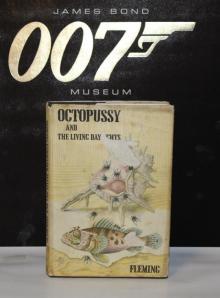 Octopussy & the Living Daylights
Octopussy & the Living Daylights On Her Majestys Secret Service
On Her Majestys Secret Service You Only Live Twice
You Only Live Twice From Russia With Love
From Russia With Love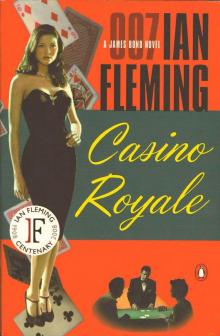 Casino Royale
Casino Royale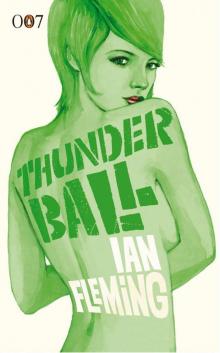 Thunderball
Thunderball For Your Eyes Only
For Your Eyes Only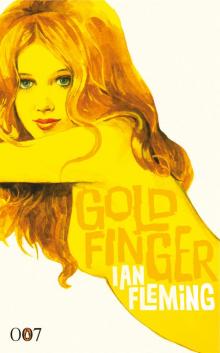 Goldfinger
Goldfinger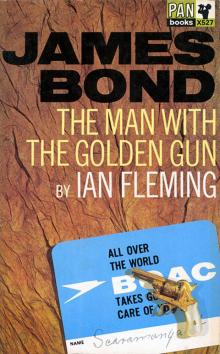 The Man With the Golden Gun
The Man With the Golden Gun The Spy Who Loved Me
The Spy Who Loved Me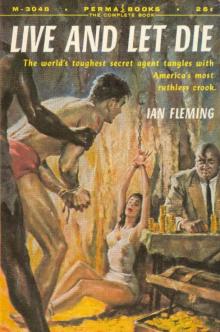 Live and Let Die
Live and Let Die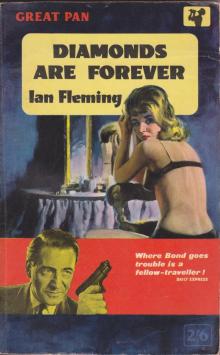 Diamonds Are Forever
Diamonds Are Forever Moonraker
Moonraker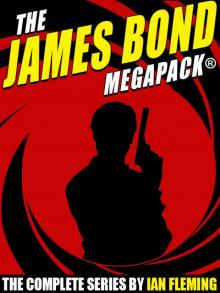 The James Bond MEGAPACK®
The James Bond MEGAPACK®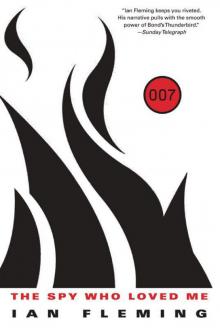 Bond 10 - The Spy Who Loved Me
Bond 10 - The Spy Who Loved Me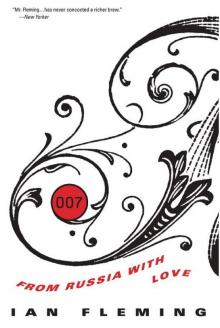 From Russia with Love (James Bond - Extended Series Book 5)
From Russia with Love (James Bond - Extended Series Book 5)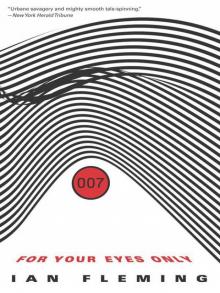 Bond 08 - For Your Eyes Only
Bond 08 - For Your Eyes Only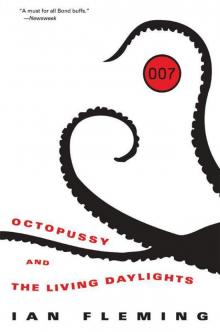 Bond 14 - Octopussy and the Living Daylights
Bond 14 - Octopussy and the Living Daylights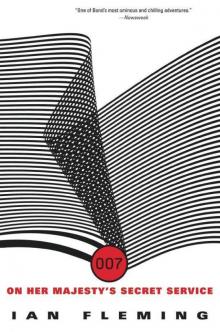 Bond 11 - On Her Majesty's Secret Service
Bond 11 - On Her Majesty's Secret Service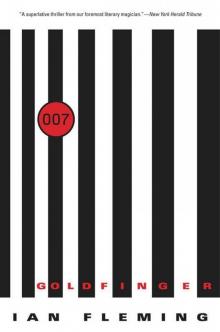 Bond 07 - Goldfinger
Bond 07 - Goldfinger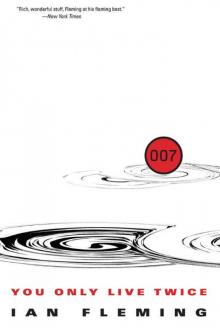 Bond 12 - You Only Live Twice
Bond 12 - You Only Live Twice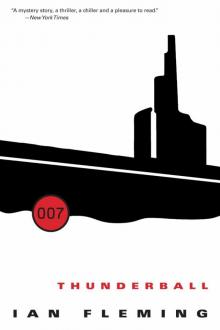 Bond 09 - Thunderball
Bond 09 - Thunderball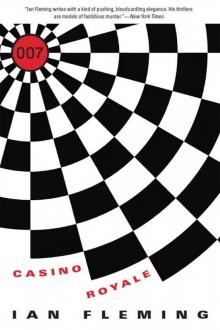 Bond 01 - Casino Royale
Bond 01 - Casino Royale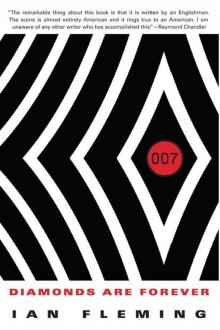 Diamonds are Forever (James Bond - Extended Series Book 4)
Diamonds are Forever (James Bond - Extended Series Book 4)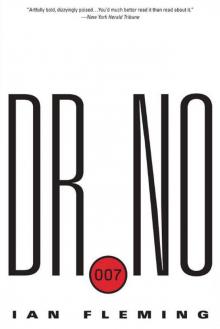 Bond 06 - Dr. No
Bond 06 - Dr. No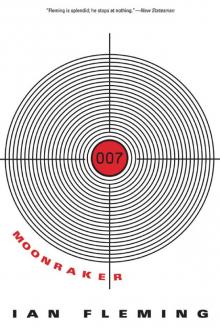 Moonraker (James Bond - Extended Series Book 3)
Moonraker (James Bond - Extended Series Book 3)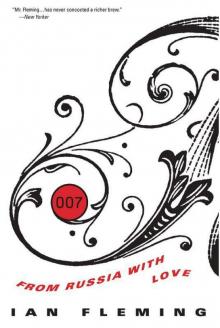 Bond 05 - From Russia With Love
Bond 05 - From Russia With Love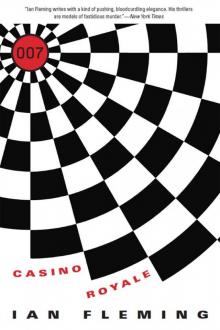 Casino Royale (James Bond - Extended Series Book 1)
Casino Royale (James Bond - Extended Series Book 1)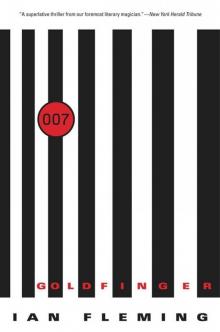 Goldfinger (James Bond - Extended Series Book 7)
Goldfinger (James Bond - Extended Series Book 7) Chitty Chitty Bang Bang: The Magical Car
Chitty Chitty Bang Bang: The Magical Car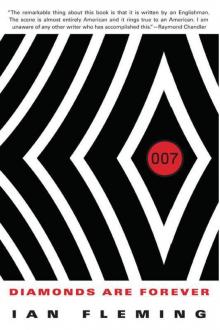 Bond 04 - Diamonds Are Forever
Bond 04 - Diamonds Are Forever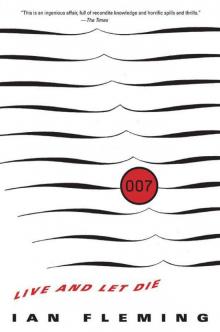 Bond 02 - Live and Let Die
Bond 02 - Live and Let Die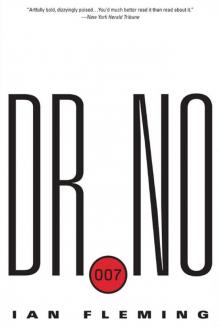 Dr. No (James Bond - Extended Series Book 6)
Dr. No (James Bond - Extended Series Book 6) The Hildebrandt rarity
The Hildebrandt rarity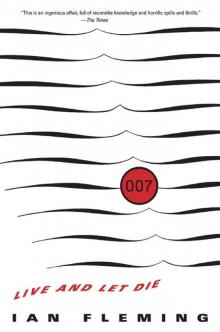 Live and Let Die (James Bond - Extended Series Book 2)
Live and Let Die (James Bond - Extended Series Book 2) Chitty Chitty Bang Bang
Chitty Chitty Bang Bang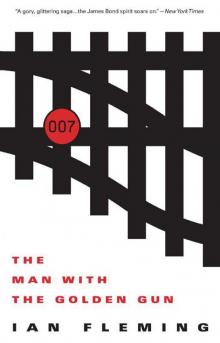 Bond 13 - The Man With the Golden Gun
Bond 13 - The Man With the Golden Gun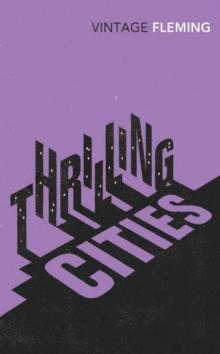 Thrilling Cities
Thrilling Cities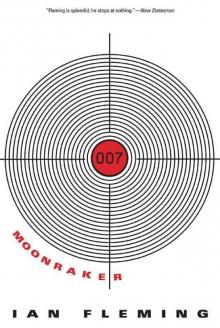 Bond 03 - Moonraker
Bond 03 - Moonraker